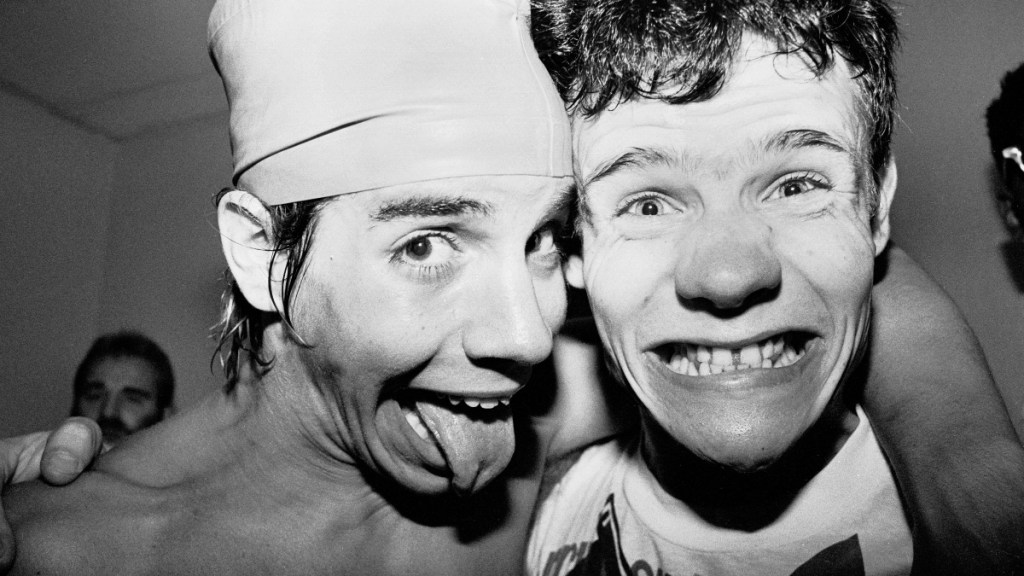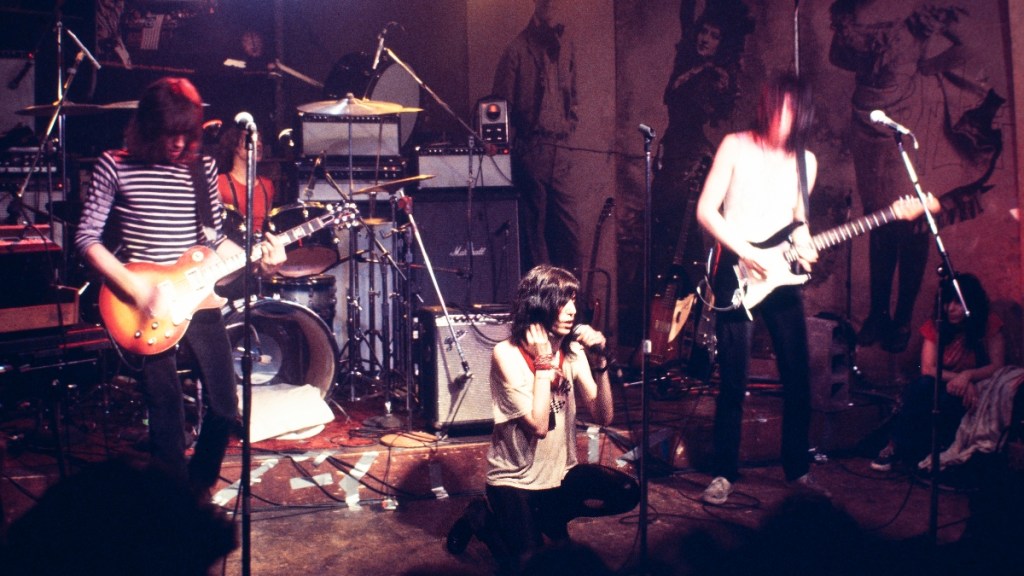
Image via Flickr user Adrian Miles
This Saturday, Brooklyn’s leg of Afropunk will be held at Commodore Barry Park in Brooklyn. Its headliners will include Lenny Kravitz, Grace Jones, Ms. Lauryn Hill, Death Grips, Danny Brown, and Suicidal Tendencies. This—a festival with a deeply talented, overwhelmingly black lineup that spans hip-hop, electronic, jazz, soul, and hardcore punk—is certainly a cultural feat, in and of itself. But has the current vision of Afropunk deviated from the vision that it sprang from?
It is indisputable that in the past 11 years, Afropunk Festival has seen stark and dramatic changes. What began as a hundreds-large gathering inspired by James Spooner’s 2003 documentary of the same name has slowly grown into a festival that amasses 60,000 attendees, boasting headlining performances from D’Angelo, Chuck D, and Saul Williams..
Videos by VICE
In 2015, Afropunk has only gotten bigger. The fest went international, holding a festival in Paris this May featuring Lianne La Havas plus Jaden and Willow Smith, and in October, will hold an edition of the fest in Atlanta.
Perhaps the most notable change is that Afropunk is no longer free. The festival, which has classically not charged admission and instead sought funding through the help of sponsors, apparel sales, and other avenues, is now charging admission. It’s $75 for the weekend, $45 for a day, and free with approved voluntary work. Naturally, questions are raised when something that’s been free for years suddenly isn’t. A big one: What’s changed for there to be a price on a festival that spotlights an underrepresented community?
Festival co-founder Matthew Morgan and co-organizer Jocelyn Cooper were ready for those questions. They were both confident as we spoke about the 11th annual festival in a Brooklyn coffee shop. It’s clear when we start talking that they’re more interested in conversation rather than a one-sided interview. Before the questioning starts, Morgan gets me to list some of my favorite acts (Kanye West and Turn on the Bright LIghts-era Interpol, I tell him), slightly laments when he learns I’m a black writer who mostly write about hip-hop (I retort it’s out of interest rather than relegation), and relates a festival organizer’s common peeve—that planning comes down to the last minute despite a year of preparation. But they’re here to answer questions, so they’re game.
The amiability flips back-and-forth between frankness as we touch on the idea of paying for Afropunk. He’s a master of a basic retort: Why not? But his points are valid. For one, people panic to shell out hundreds for Air Jordan releases but are perturbed by a festival fee that’s a fraction of that price. And surely a festival with a pro-Afro message is worth $70. It ties back to a common maxim: If the black community doesn’t place value within itself, then who will?
“There’s a whole value proposition that we have to invest in ourselves,” Morgan says. “What is it that people like about the festival? What is unique? What is important? How does it make you feel? And if that experience collectively isn’t worth $70, then we don’t deserve it. Then go to Pitchfork. Go to Lollapalooza. Go to Bonnaroo. Go support them with your money. Or, stay home.”
Morgan’s points aren’t bits of slick marketing: the festival landscape is overwhelmingly white. Perhaps supporting a predominantly African-American business when Budweiser is raking in money from the Jay Z-founded Made in America festival (“Do they worry about giving Jay Z another million?” Morgan asks) isn’t a bad idea. But from 2003 to 2015, Afropunk hasn’t just grown—it’s been reimagined. It’s a question of how far that reimagining and that all-encompassing ambition move away from the original film’s dedication of: “to every black kid who has ever been called a nigger…and every white kid who think they know what that means.”
Break down the term “Afropunk” to its roots and you get, “African-American rebellion.” But being an African-American and being one in the rebellious culture of punk rock comes with its own complexities. Black lineage at the start of rock is a hidden one. Chuck Berry and Little Richard’s light are eclipsed by Elvis Presley’s pilfering and Keith Richards’ licks. Whitewashed out of something they helped create, African-Americans were forced to do something they’ve been forced to do for centuries: Be resilient. Move forth and create with the little we’ve been given. Hip-hop was made from this need. The black fans who identified with the thrills of punk found a harsh truth: It wasn’t their rebellion. White punks have the ability to rage against their privilege by night, while covering their tattoos by day. Blackness can’t be sheathed, and thus to be black is to be in a constant state of rebellion.
Spooner’s documentary explores a rebellion that’s two-pronged: being the “Rock n’ Roll nigger” in what could be a non-inclusive, predominantly white environment, and having that blackness questioned by your own kind.
Inspired by his own experiences in the punk rock scene, Afro-Punk came during somewhat of a dry period for black rock—decades after greats Fishbone and Bad Brains peaked, but shortly before Bloc Party and TV on the Radio (Kyp Malone appears in the film) gained their footing. African-Americans in punk just didn’t register in the early ’00s.
It’s 12 years after the documentary premiered. Spooner, who’s forever going to be attached to it (his Instagram bio snarkily states, “And yeah I made the afropunk movie”), has moved on to tattoo artistry. He owns a tattoo parlor over in Los Angeles, but he’s eating lunch before working on a client in a Park Slope parlor. Spooner is busy and bi-coastal, but he’s vivid and enthusiastic when talking about the climate that birthed Afro-Punk. “When I started making the film in 2001, I would Google ‘black punk’ and there was nothing. Zero,” Spooner recalls.
The film, a DIY effort that featured interviews with African-Americans in the punk scene, became a connector for the many African-Americans nationwide who shared the struggles expressed in the film. They conversed on the message board on the film’s website, which hosted a tight-knit community that birthed real life friendships.
“For these kids, it was really like their salvation, they really wanted to meet each other,” Spooner says. “So they started talking about organizing a meet up.”
That meet-up became the inaugural Afropunk in 2005. Headquartered at the Brooklyn Academy of Music and co-curated by Spooner and Morgan, the event was a spontaneous affair packed with curated films, shows at the now defunct CBGB, and a simple picnic with people bonding over a shared passion. “That, to me, was everything that the festival was meant to be,” Spooner says. Afropunk in its original form was a product of the punk ethos of Spooner and the music industry know-how of Morgan, who saw potential in the Afropunk brand and invested his own money in making the festival a reality.

A crowd at Afropunk 2013. Photo via Flickr user Daniel Latorre
The difference between Spooner’s and Morgan’s Afropunk ideologies progressed from a crack to a fault by 2008. That year, Afropunk message board users were surprised to see that the grungy digital hangout spot they frequented suddenly had a white color scheme, on its way to becoming a web magazine (Jenny Hates Techno guitarist John M. Ellison, known on the boards as ghettopunkrocker, recalls: “I remember I logged on and was like, ‘Wait, what the hell?’). The messages shared on the site were gone which angered some users enough to leave all together. Spooner also felt alienated from the festival. It had been a chill picnic just a few years ago. Now, a market study was telling him black people liked the color red. So, because Mountain Dew helped fund a festival, he had to watch young attendees take promo pictures as they held free Code Red Mountain Dew: “It was like, shit, that’s so not punk,” he says. Spooner, who’d never cared too much for organizing a festival in the first place, ended his involvement with Afropunk in 2008.
The fall of the original message boards was probably inevitable; the real time communication and the accessibility of Facebook would’ve obsolesced it. Plus, Afropunk grew larger than its hundreds of active board members. The sea change was coming.
“I remember making this post on the old board when more people were going on: If this place becomes like a magazine or much bigger than it was, you can kiss it all goodbye,” message board member Damos Abadon told me. “Not long after that, it changed.”
It seems Spooner’s vision didn’t really change all that much from film’s themes: that search for interpersonal connection through white noise within a more genre-specific lens. Morgan, who came from a music industry background, saw potential. There were others living in boxes, too: alternative hip-hop, alternative R&B, LGBT members, the natural hair community, etc. A more wider definition of Afropunk—”freedom,” as Cooper puts it—worked as an umbrella for all those facets of the black experience.
On Noisey: An Oral History of D’Angelo
These days, Spooner’s focus is tattooing. He’s so out of the Afropunk loop, he claims, that he didn’t know the festival he started was charging admission until I inform him of that fact. Although the festival is behind him, Spooner does get melancholic about what it was. “It’s challenging to see—like birthing a baby, raising him, and letting it go out and completely disappointing you,” Spooner says of what Afropunk has become.
Members of that defunct board have all given different reasons for their distance with current Afropunk (although none conceded they’d simply grown up). One felt it became another brand. Another felt that the second half of the festival’s name is overlooked; D’Angelo will get that headline billing over Bad Brains every time. However, the skepticism isn’t only held by the OG members. Cynthia Francillion, four-time Afropunk attendee (twice a volunteer), commended Afropunk for giving the natural hair community an avenue to express itself. Black business need support, too, but as most would be, her friends are skeptical about something personally impactful being corrupted. Francillion told me, “They’re afraid that Afropunk is going to sell out. They’re afraid that Afropunk is going to become a Coachella.”
Follow Brian on Twitter.
More
From VICE
-

-

Gary Gershoff/Getty Images -

Charlie Steiner – Highway 67/Getty Images
